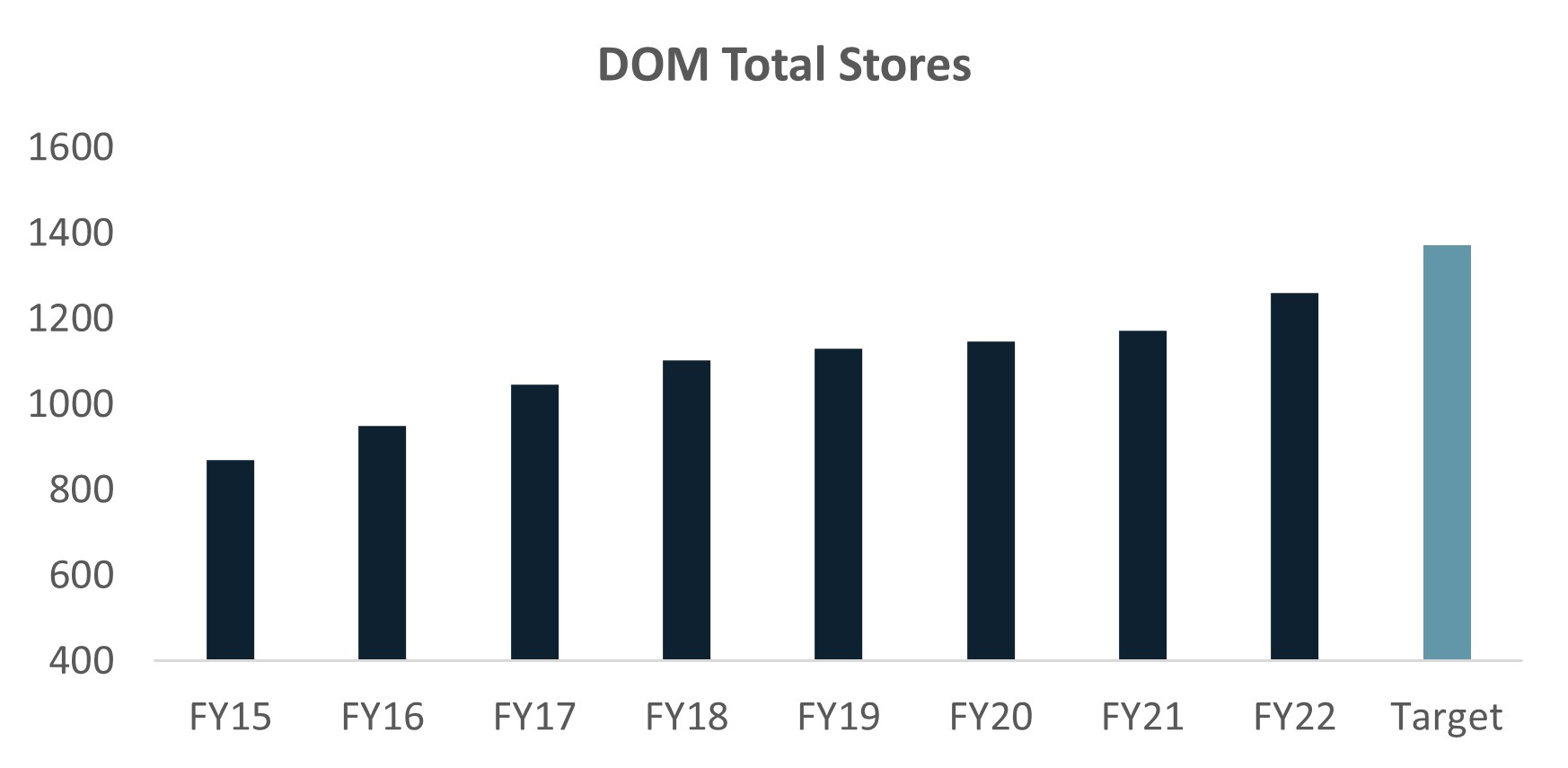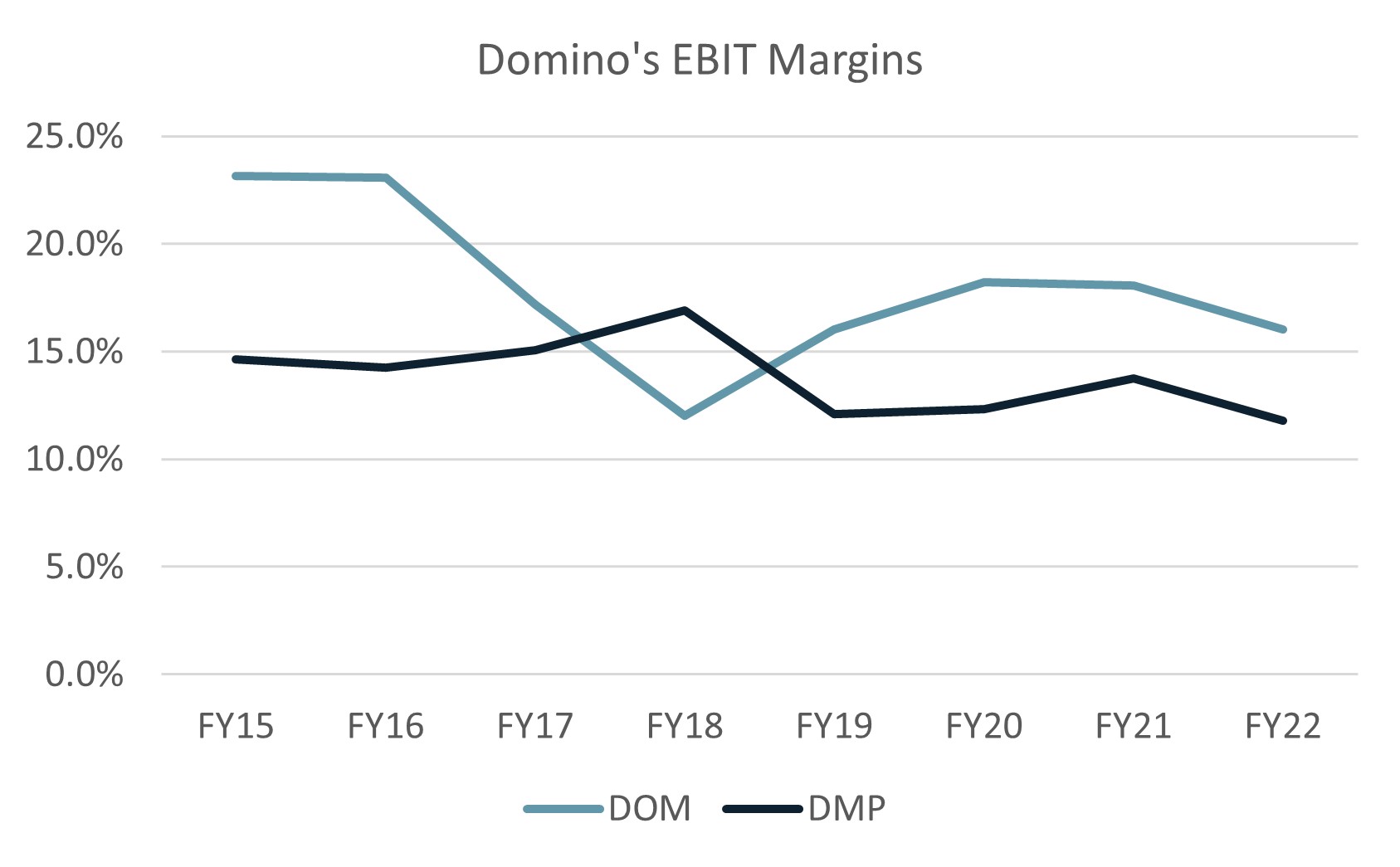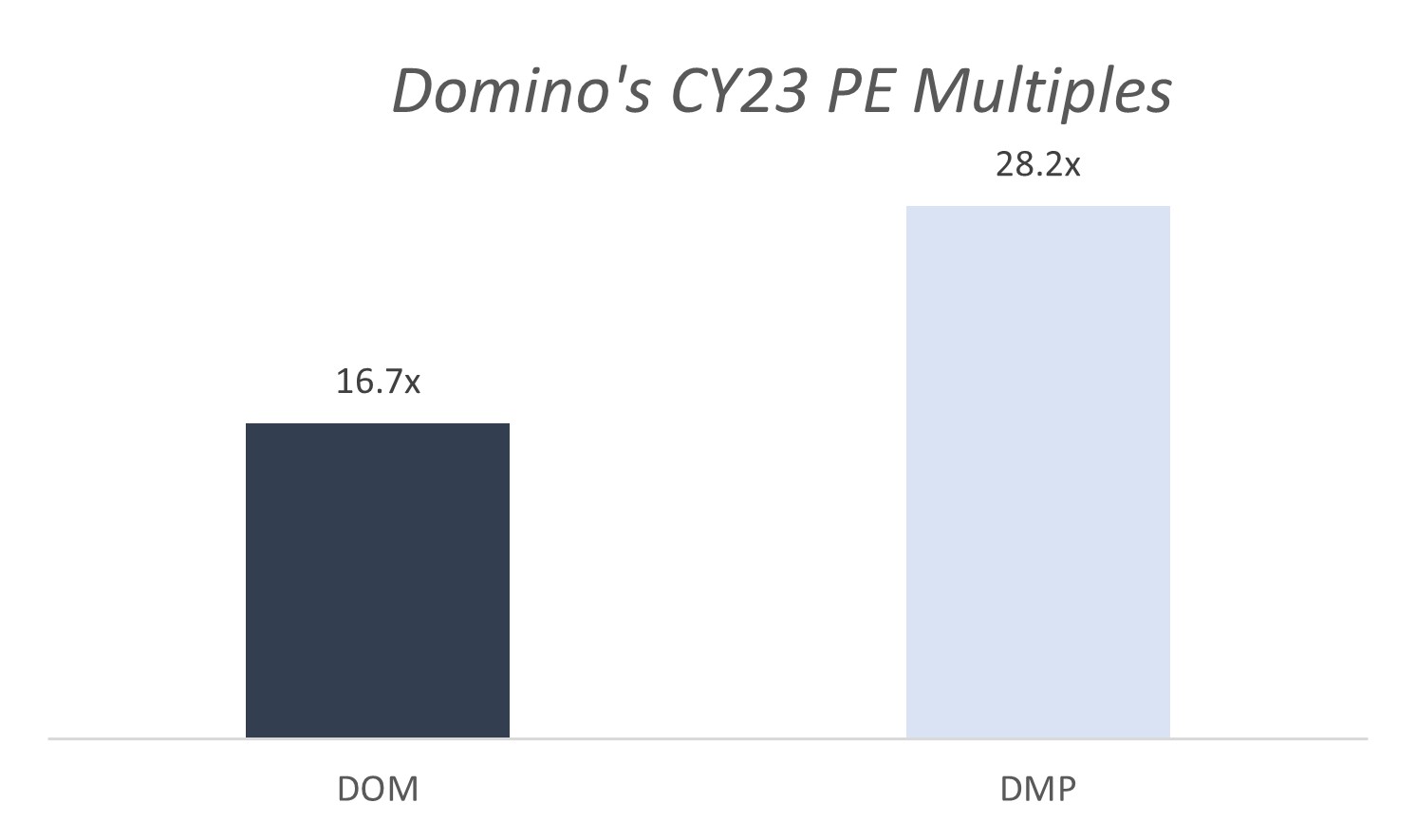Domino’s Pizza: Another way to slice it
There are few things Australians will concede that our British rivals do better than us, especially when cricket is involved. Nevertheless, when it comes to their approach to franchised, fast delivery pizza, we think they could be onto something.
Since the early 1990’s Domino’s Pizza Group (DOM.LSE) has been the master franchise for Domino’s UK-based franchisees. Just like Domino’s Pizza Enterprises (DMP.ASX) in Australia, DOM was anchored by its success in its core home market (UK) operations before looking to expand across adjacent markets in pursuit of an accelerated store roll-out. This strategy resulted in franchises being originated in Iceland, Sweden, Norway, and Switzerland along with a joint venture in Germany with DMP.
Despite the European opportunity appearing great, the outcome was less so. The store roll-out in new markets created a meaningful drag on group operating performance and profits while at the same time shifting management’s focus away from its highly successful UK & Ireland franchisees. Whilst a slow uptake in initial sales and store performance is to be expected in new markets, the improvement never arrived leading to the decision in October 2019 to exit all of DOM’s directly operated international markets.
With the exit of international markets came a major repositioning for DOM and what we believe to be a significant opportunity going forward.
Since 2019 DOM has successfully divested all its international businesses, including exercising its German put option to DMP, to focus solely on its core UK/Ireland market and maximise shareholder returns.
In tandem with an operational reposition, major changes were initiated at a board level with a complete turnover of directors since 2019. This has resulted in a board comprised of restaurant/consumer veterans with meaningful skin in the game. Current Director Usman Nabi’s shareholding of circa £80M via his investment fund Browning West Group along with Non-Executive Director and Current Interim CEO Elias Diaz Sese’s shareholding of £1.93M (purchased on-market) shows alignment is not an issue.
DOM now currently operates 1,231 franchised and 30 corporate stores across UK & Ireland. Similar to the Australian business, DOM has a dominant market position with close to 50% market share in takeaway pizza and 8% of total takeaway market share.

Source: Domino’s Pizza Group
The success of a franchisor business stems directly from the health of its franchisees and it was clear that following the company’s misadventure into Europe, its relationship with the UK franchisee base was strained. In December 2021 DOM reached a resolution with its franchisees aimed at improving collaboration, alignment and accelerating the company’s growth in the region.
The agreement entailed a £20M digital investment by the franchisor, increased marketing investment to align on national campaigns, an enhanced food rebate mechanism to encourage order growth, along with a new store incentive scheme to reward new store openings across the UK.
Along with a new franchisee agreement the company announced new medium-term ambitions of 200 new stores in the UK & Ireland along with a target for the upper end of its £1.6B - £1.9B range in System Sales. With guidance implying 50-70 store openings this calendar year (following 35 openings last year) the medium-term store target appears conservative to us.

Current interim CEO Elias has made his priorities for CY23 and beyond clear:
1. Franchisee Profitability and Organisation
2. Value for Money offering
3. Digital Improvement
4. Convenience
5. Technology Platform Projects
Fast forward to today and it appears the re-positioning and improved franchisee alignment is beginning to pay off. Having averaged Like for Like Sales growth of mid-single digits pre-COVID, the company has returned to above average LFL’s (ex. VAT tax rate changes) as of 1Q23. Furthermore, DOM has seen accelerated store openings with 15 this year vs 9 in the same period for FY22. Additionally, 30 franchisees currently have stores in development providing strong anecdotal evidence towards the improvement in franchisee profitability.
(During COVID to assist restaurant owners the UK government lowered the “value-added tax” (VAT) for restaurants in the UK from 20% to 5%, creating an increased period of franchisee profitability during 2020/2021 as it was phased in and out)
UK store level EBITDA margins remain 200bps higher vs pre-COVID with initiatives incentivising collection orders offsetting the normalisation from COVID benefited deliveries. Additionally, DOM reached an agreement late last year for a national roll out on the Just Eat Takeaway network. With 18M active customers vs 13M of DOM active users it has provided access to incremental customer orders, driving increased volumes, whilst DOM still controls the delivery process to maintain service and quality standards.
By doubling down on its core market, re-aligning with its franchisee base and increasing its cost discipline, DOM has been able to rectify a major slide in margins brought upon initially by international expansion. In fact, EBIT margins (incl. lease costs) have inflected above DMP via the focus strictly on the UK & Ireland market.

Source: Domino’s Pizza Group & Domino’s Pizza Enterprises Annual Reports, Totus Capital
DOM has not been immune from the inflationary pressures experienced globally over the preceding two years and with it some margin pressure. The increased costs of food and other key inputs were initially worn by the parent company. Though, as these costs are slowly passed through to franchisees we expect EBIT margins to stabilise with deflation in dairy and packaging starting to pass through the business together with lower energy costs.
With a strict focus on its core market vs international expansion ambitions, DOM has also been able to implement a stringent focus on capital allocation and prioritise returns to shareholders.

Source: Domino’s Pizza Group
Since 2020, by way of the above framework, the business has been able to:
- Spend £53.4M on capital expenditures for long-term organic growth (2023 expected to be a short-term capex peak)
- Pay out £125.4M in dividends whilst growing the dividend by 10% to £0.10 per share.
- Repurchase £189.5M of shares on issue.
Overall DOM has been able to return £315M to shareholders since 2020, with a current market cap of £1.17B
As of CY22 the company’s Net Debt/EBITDA leverage ratio sat at 2x, (within the company’s targeted 1.5x -2.5x range), with 70% of debt fixed at 4.26% interest to 2027. By exercising the German JV put option to DMP the company received £79M in June of this year, so including these proceeds further lowers the leverage ratio to 1.4x. The company has expressed a desire to feed the proceeds from the put option through the capital allocation framework over time. With a working capital headwind turning to tailwind, plus a short-term peak in capital expenditures in CY23 the path to additional capital returns beyond the dividend is not a difficult one.
Whilst the capital returns appear attractive, the valuation to which you can buy an asset-light royalty business focusing on its core market is also worth noting.
DOM trades on 16.7x PE for CY23 - a significant discount to its peer, reflecting the shorter growth runway within its domestic market vs international expansion plans for DMP.

Source: Bloomberg, Totus Capital. (As at 12/07/2023)
We liken the strategy of DOM to the equivalent of an Australian-only focus for DMP. Whilst the core market strategy deserves a multiple discount relative to the growth runway of its peer, the growth opportunity in DOM’s core market remains significant with the master franchisor (DPZ.NYSE) estimating a UK maximum store density of 1,600 vs the current footprint of 1,276.
With some conservative assumptions:
- 3-5% Like for Like Sales growth continuing.
- 2-3% store growth over the medium term (CY23 guided for “mid-single digits”)
- No reversion in Group EBIT margins (despite pass through cost lags and transitory pressures)
- Maintain the 50% payout ratio, 30% reinvestment rate & remaining 20% to buybacks.
- PE Multiple remains constant.
Gives expected IRR’s of 9-12% p.a over the next 5 years, and should margins revert back to 2020/21 levels IRR’s could increase to 12-15% p.a.
With inflationary pressures impacting the business and broader equity market pessimism, DOM had sold off initially through 2022. The slide in the share price only intensified following UK market volatility due to the Gilt Crisis in September 2022, which with hindsight presented an opportune entry point.
This note helps highlight that the flexibility to look globally can present attractive investment opportunities relative to Australia. In the case of DOM, we think that you can buy a quality franchise that you are familiar with locally but at a significantly cheaper price and with confidence of shareholder returns.
Disclosure: Totus owns DOM in the Totus Alpha Strategy vehicles. This is an independent wire contributed by Totus Capital.


1 topic
1 stock mentioned
2 funds mentioned

